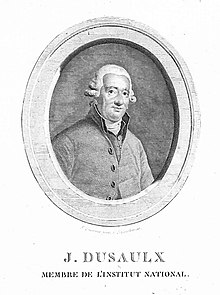| Jean Dusaulx | |
|---|---|
 Portrait of Jean Dussaulx or Dusaulx by Gaucher from Ducreux, 1749 Portrait of Jean Dussaulx or Dusaulx by Gaucher from Ducreux, 1749 | |
| Born | 28 December 1728 Chartres |
| Died | 16 March 1799 Paris |
| Occupation | Jurist, writer |
Jean-Joseph Dusaulx, (28 December 1728, in Chartres – 16 March 1799, in Paris) was a French politician during the French Revolution. He was friendly with Jean Sylvain Bailly, the mayor. In February 1792 he was elected as a member of the "Conseil Général" of the Paris Commune. He denounced the September Massacres, and voted against the execution of Louis XVI. In Spring 1793 was attacked by Billaud-Varenne, arrested, but saved by Marat, as being too old to become dangerous. In 1795 he was elected in the upper house of parliament, the Council of Ancients.
Works
Dusaulx was a man of letters, a lover of the works by Jean-Jacques Rousseau, corresponded and organized a dinner for him where the famous author read his Confessions for the audience (1770-1771).
Dusaulx is known for his translations of Satires (Juvenal) (1770), and he wrote passionate about gambling (1775, 1779) and travelling and going into the mountains (1788). As a librarian of the Arsenal, he published a history on the Storming of the Bastille (1790). In 1798 he published "De mes rapports avec J. J. Rousseau".
References
- Installation du Conseil-général de la Commune : 24 février 1792, l'an quatriéme de la liberté
- Mémoires sur la Vie de J. Dusaulx, écrits par sa Veuve by Jeanne Dusaulx (1801)
This article about a translator from France is a stub. You can help Misplaced Pages by expanding it. |
- 1728 births
- 1799 deaths
- 18th-century French writers
- 18th-century French male writers
- Deputies to the French National Convention
- Members of the Legislative Assembly (France)
- 18th-century French historians
- French translators
- Writers from Chartres
- French male non-fiction writers
- 18th-century French translators
- Politicians from Chartres
- French translator stubs